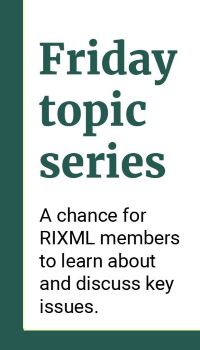The RIXML Standards Suite
The RIXML Standards Suite is designed to provide a streamlined mechanism for buy-side firms, sell-side firms, vendors, and other firms involved with investment interactions and research to accomplish several tasks, including capturing the details of inter-firm interactions required to be captured by MiFID II regulations and the details of investment research. Designed with efficiency in mind, these standards leverage shared tags when possible, with specialized tags and tag sets developed to enable capturing specific content.
The Suite is structured as a set of XML schema files. None of these files is an entire standard by itself, but are combined into a number of different tag sets, each of which accomplishes a specific goal. In order to further improve efficiency, the standards leverage other tag sets (such as XBRL for content describing financial data) and ISO standards (such as language codes and market identifier codes) whenever possible to streamline the process of implementing and maintaining our standards on the back end.
The Standards
RIXML.org has created several distinct standards, each designed to accomplish a specific task. Each standard is comprised of tags from various schema files. The full description of each standard is available in its documentation.
The RIXML Research Standard provides a set of tags and rules that can be used to describe investment research documents, audio files, etc. Using the RIXML Research standard enables firms to improve the process of categorizing, aggregating, comparing, sorting, searching, and distributing global financial research.
The RIXML Interactions Standard provides a set of tags and rules that can be used to describe interactions involving research providers, research consumers, corporate representatives, and third-party experts. This standard was created to help firms comply with the changes to the EU’s Markets in Financial Instruments Directive (MiFID II).
The RIXML Coverage Updates Standard gives a publisher the ability to communicate changes to its coverage universe, including updating the list of companies covered by a particular analyst.
The RIXML Roster Updates Standard enables a research publisher to communicate changes to the groups of people playing various roles on its behalf in the investment research marketplace (such as a financial services firm updating its roster of research analysts with aggregator partners).
Using the Suite
The standards in the RIXML Standards Suite are free for use by any individual or firm. Membership in the RIXML organization is not required. Documentation for each of the standards can be found on the relevant page.





